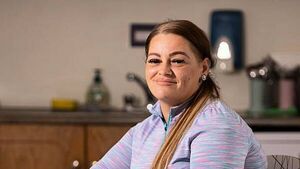Limerick woman who beat heroin addiction now helps others find hope

David Raleigh
Childhood trauma led Stacey Quin to numb her pain with drugs when she was just 14 years old.
By 18, Quin, from Southill, Limerick, was pregnant with her first child, addicted to heroin, and sleeping on the streets.
She hit rock bottom and had ratcheted up a raft of petty theft convictions.
“By the time I was 18, I was hooked on heroin, I was doing my leaving cert, and I was sick with aches and pain in my body,” Quin said.
Now aged 37, and a mother to four children, Quin is seven years drug-free, living under a roof, and helping others back from the brink.
Currently in her fourth college year studying social studies, Quin is also a support worker with the national housing charity and drug support service NOVAS, which on Friday, World Homeless Day, launched its annual report for 2024.
“I went through years of trauma, homelessness, and things only began to change when I met people and services that didn’t judge me,” Quin said.
With her life and her children on the line, she engaged in treatment services at Ana Liffey and Coolmine, which helped her take control of the addiction that had enslaved her.
“I learned about harm reduction, self-worth, and community. Those experiences helped me slowly rebuild my confidence and see that I had something to offer,” Quin said.

“Now, I work as a relief worker with Novas, and I’m proud to be part of a team where I support people who are where I once was — facing addiction, trauma, and homelessness,” Quin explained.
“I use my lived experience to connect with the service users, to show them that change is possible, and to remind them that they’re not alone.”
“Working with Novas has shown me the power of compassion. It’s not just about providing housing — it’s about building trust, safety, and hope,” she added.
Novas revealed at the launch of its annual report for 2024, on Friday, that it helped 6,300 people last year - a 160 per cent increase over the past decade.
It said that Limerick, where it has its headquarters, is one of the worst-hit areas nationally, and is experiencing a “surge” in demand for emergency accommodation and housing.
“We cannot meet demand, it’s gravely concerning”, said Una Burns, NOVAS head of advocacy and communications.
Burns also warned of a rising tide of people, particularly women, currently experiencing “precarious living conditions and rough sleeping” in the Treaty City.
“There is about 60 people rough sleeping in Limerick City at the moment, and 38 of those are women,” she said.
“That is really unprecedented, and it is unusually in the broader national landscape. So, we definitely have a rising issue of women experiencing homelessness and addiction - it’s extraordinarily high.”
Many, but not all, who are sleeping rough, have come to Limerick from other counties due to the availability of cheaper drugs, including crack cocaine, benzodiazepines, heroin, cocaine, and cannabis.
Novas said that, among single adults entering its emergency accommodation last year, 46 per cent had come directly from other homeless services, 20 per cent had been rough sleeping, and seven per cent arrived from a hospital.
Only four per cent had been living in private, social or family housing before entering emergency accommodation, “which highlights the entrenched nature of homelessness for many,” Novas said.
“Family homelessness” also deepened during 2024, with more than 4,500 children residing in hotel rooms, homeless hubs, and other temporary accommodation.
Novas said it alone supported more than 1,400 children through housing, emergency accommodation and tailored family supports, which was “the highest number in the organisation’s history”.
Burns says more funding is needed to expand Novas’s operations, including its nightly street outreach service, accommodation for vulnerable women, family supports and its trauma-informed services for those in addiction.
Despite “ongoing pressure” across its services in Limerick, Dublin, Kerry, Tipperary, Clare and Cork, NOVAS said it housed 1,419 people, delivered emergency accommodation to those in acute need, and supported young people to build pathways to safety and independence in 2024.
Despite it all, Burns remains hopeful: “The statistics are grim, but we are a wealthy country and we can solve homelessness with the right policies, and the will, and Stacey’s story is an inspiration to all of us.”
Quinn, who is proof of that, concluded: “I was a person who was literally living on the streets, and now, being able to go to work and give my landlord rent, and to be able to give back to people using the services like I did before, is a good feeling.”






